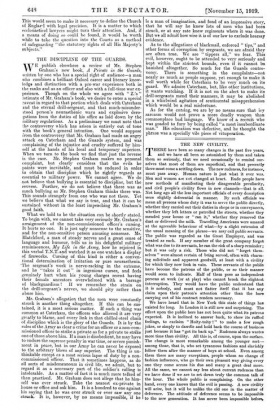THE DISCIPLINE OF THE GUARDS.
WE publish elsewhere a review of Mr. Stephen Graham's new book, A Private in the Guards, written by one who has a special right of audience—a man who combines a brilliant Oxford career and literary know- ledge and distinction with a pre-war experience both in the ranks and as an officer and also with a full-time war ex- perience. Though on the whole we agree with " Z.'s " estimate of Mr. Graham's book, we desire to enter a special caveat in regard to that portion which deals with Caterham ind the eternal drill-sergeant, and that much-misunder- atood person's neurasthenic ways and explosive dero- gations from the duties of his office as laid down by the military regulations. As a preliminary we must note that the controversy v, hich has arisen is entirely out of tone with the book's general intention. One would suppose from the controversy that Mr. Graham had made an angry attack on Caterham and the Guards system, and was complaining of the injustice and cruelty suffered by him- self at the hands of his local and temporary superiors. When we turn to the book we find that just the reverse is the case. Mr. Stephen Graham makes no personal complaint, but clearly considers that the evils he paints were inevitable, and must be endured in order to obtain that discipline which he rightly regards as essential to military power. We cannot agree. We do .not believe that bullying is essential to discipline, but the • reverse. Further, we do not believe that there was as much bullying as Mr. Stephen Graham thinks there was. This sounds strangely from one who was not there. Yet we believe that what we say is true, and that it can be sustained without in the least impeaching Mr. Graham's good faith.
What we hold to be the situation can be shortly stated. To begin with, we cannot take very seriously Mr. Graham's arraignment of the non-commissioned officer's cursing. It hurts no one. It is just ugly nonsense to the sensitive, and for the non-sensitive person amusing nonsense. Mr. Blatchford, a man of steady nerves and a great sense of language and humour, tells us in his delightful military reminiscences, My Life in the Army, how he rejoiced in this verbal T.N.T. and watehed it as one watches a display of fireworks. Cursing of this kind is either a conven- tional determination of irritation or pure neurasthenia. The sergeant's work is nerve-racking in the extreme, and he " takes it out " in ingenious curses, and feels genuinely hurt when his young charges resent having their female ancestors overwhelmed with a barrage of blackguardism I If we remember the strain on the drill-sergeant's nerves, we should pity rather than abuse him.
Mr. Graham's allegation that the men were constantly struck is another thing altogether. If this can be sus- tained, it is a most serious matter. If such a thing was common at Caterham, the officers who allowed it are very greatly to blame, and every link in that chilled-steel chain of discipline which is the glory of the Guards. It is by the rules of the Army as clear a crime for an officer or a non-com- missioned officer to strike a private as for a private to strike one of those above him. If a man is disobedient, he may have to endure the supreme penalty in war time, or severe punish- ment in peace, but in our Army he can never be exposed to the arbitrary blows of any superior. The thing is us- thinkable except as a most serious lapse of duty by a non- commissioned officer. That it sometimes happens, as do all sorts of misdemeanours in civil life, we admit, but to regard it as a necessary part of the soldier's calling is intolerable. As a matter of fact it is much more talked of than practised. Mr. Graham does not allege that he him- self was ever struck. Take the nearest ex-private in house or office and ask him. It is a hundred to one against his saying that he was ever struck or ever saw any one struck. It is, however, by no means impossible, if he is a man of imagination, and fond of an impressive story, that he will say he knew lots of men who had been struck, or at any rate knew regiments where it was done. But we all admit how wise it is of our law to exclude hearsay evidence.
As to the allegations of blackmail, enforced "tips," and other forms of corruption by sergeants, we are afraid they are often true. We are "tippers all," we fear. This evil, however, ought to be attended to very seriously and kept within the strictest bounds, even if it cannot be banished altogether. So much for the Guards contro- versy. There is something in the complaints—not nearly as much as people suppose, yet enough to make it well worth while for Caterham to be very much on its guard. We admire Caterham, but, like other institutions, it wants watching. If it is not on the alert to make its drill-sergeants mend their manners, it may be abolished in a whirlwind agitation of sentimental misapprehension which would be a real misfortune.
As for the cursing, we are by no means sure that icy sarcasm would not prove a more deadly weapon than commonplace bad language. We know of a recruit who was goaded to fury by being called "a most insubordinate man." His education was defective, and he thought the phrase was a specially vile piece of vituperation.






































 Previous page
Previous page